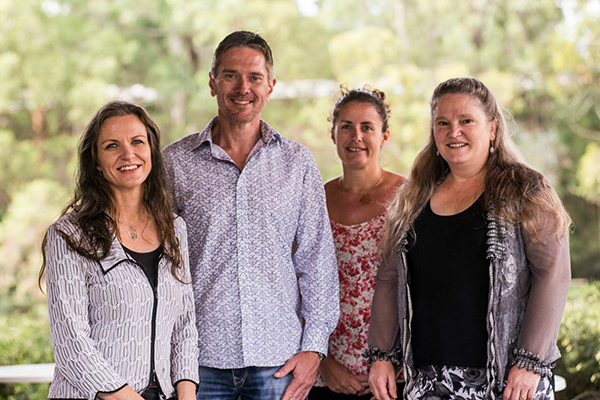February 20, 2015
Researchers to present groundbreaking work on omega-3s at world conference
A multidisciplinary team of researchers from UOW have been invited to share their groundbreaking work on the role of omega-3s in behaviour at a world conference on brain mapping.

From left: Dr Pia Winberg, Dr Mitch Byrne, Dr Francesca Fernandez and Associate Professor Barbara Meyer.
Nutrition expert Associate Professor Barbara Meyer and sustainable seafood expert Dr Pia Winberg will travel and represent the team including psychologist Dr Mitch Byrne and geneticist Dr Francesca Fernandez to the 12th Annual World Congress of Society for Brain Mapping and Therapeutics in Los Angeles from 6-8 March.
While there, the team will present their extraordinary findings (which are soon to be published in the journal PLoS One) of a year-long study that revealed prison inmates who are low in omega-3s are more aggressive and more likely to have attention deficit disorder (ADD) behaviours, the preliminary results of which were reported on ABC’s Catalyst last year.
The Congress is supported by Barack Obama’s new Brain Initiative, which aims to uncover the mysteries of the brain and associated disorders such as Alzheimer’s disease, Parkinson’s disease, depression and Post-Traumatic Stress Disorder.
The story of how the motley multidisciplinary team of researchers came to undertake a clinical trial in a NSW Correctional Centre is an interesting one.
Instead of meeting at UOW, where the two lead researchers, Professor Meyer and Dr Winberg had both been working for many years, it was chance meeting at a conference on seafood and health that bought these great minds together – for one wild idea.
“We knew that there was the potential for marine omega-3 supplementation to reduce aggression in prisoners, and what better place to test that idea than the new South Coast Correctional Centre!” Dr Winberg said.
Associate Professor Meyer credits the team’s success to the encouragement and support of the University as well as a very constructive partner in NSW Corrective Services.
“The University has sponsored the attendance to present this work – a credit to the stimulation of multidisciplinary research and University Research Committee start-funding opportunities at UOW, showing that with small funding things can go a long way.”
The team is now planning a larger trial, which would include multiple correctional centres in NSW, SA, ACT and Tasmania.


